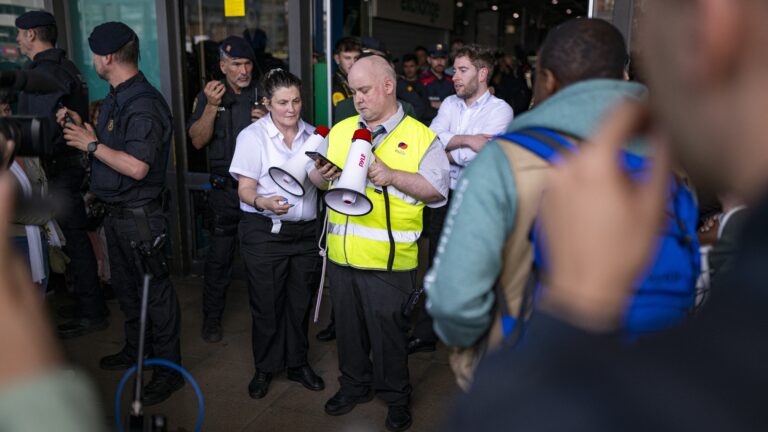The last five years in Budapest have been a downward spiral, with the city running out of money, developments stalled, public safety deteriorating and the streets becoming increasingly littered. This is felt by locals and visitors alike.
There is hope that things will turn for the better, as Fidesz has recently announced its mayoral candidate in the person of former government spokesperson Alexandra Szentkirályi, who, with her substantial experience in municipal government (having been one of the deputy mayor of Budapest in the Tarlós era) could be a strong challenger to the current mayor, Gergely Karácsony.
Before looking at what Karácsony has done (or rather, has not done) for the Hungarian capital, let’s start with some basics. Budapest is a two-tier municipality, with 23 districts, each with its mayor and assembly, while the capital city as such has an assembly and a chief mayor, too. This structure is broadly understandable, but as always, the devil is in the details. In practice, the functioning of Budapest is a legal disaster. The powers and responsibilities are scattered and overlap, forming a jungle where even the most seasoned jurists may lose their way, having a hard time telling state, district and metropolitan responsibilities apart. In short, we must admit that Budapest is not easy to manage.
After this brief lesson in municipal law, let’s look at the subject proper of our article: the failed leftist leadership of the capital city. It all began in 2019, when after nine years of a successful conservative, right-wing governance, the left-wing forces took power. What followed was practically a reversal of most of what Fidesz-backed Budapest Mayor István Tarlós had achieved. If I wanted to write an article about what changed and developed in Budapest between 2010 and 2019, I would have to write a book; but
if I were to look at what has happened since 2019, a TikTok video would be an embarrassingly long genre.
So, instead, let’s look at what hasn’t happened in the capital ostensibly led by Gergely Karácsony (in reality, it is led by Democratic Coalition President, former disgraced Socialist PM Ferenc Gyurcsány, hiding behind Karácsony’s endearing smile).
Karácsony’s first term will pass without any metro or tram construction being carried out. But that is just the tip of the iceberg. Karácsony, who led the left-wing coalition to the conquest of the city hall, made a long list of promises during his election campaign five years ago. Well, he has delivered on only a quarter of them, while most of his promises have remained unfulfilled.
One of his significant pledges was to have Budapest’s outpatient clinics renovated and made more efficient—most of these clinics are run by the districts or the municipality of Budapest. While Karácsony has not delivered on that promise at all, the central government did not wait for him: through the Healthy Budapest Programme, it has allocated 122 billion forints from the budget over the course of the last six years to renew Budapest’s clinics. In the meantime, the salaries of doctors and most health workers have been drastically increased, and the health care of Budapest residents has been greatly improved. Meanwhile, it remains a mystery what Karácsony has done for the health of the citizens of the city he leads.
He also promised a lot of things regarding improving housing conditions in Budapest, including student halls, the building of council housing and the preservation of the capital’s real estate assets (as opposed to the latter, at one point they even wanted to sell the building of the town hall itself, a scandal known as the Városházagate). Results? No sign of student accommodation construction. By contrast, the government also promised the same and delivered. It has taken over more than fifty private halls and has already renovated 8,000 in the value of 150 billion HUF.
Okay, one might say, Karácsony may have failed in one area, but in the field of social issues a left-wing mayor must have achieved a lot. What he promised sounded very good indeed, for example, that he would help reduce the number of homeless people. You don’t have to walk around the city much to feel that nothing has come of that either. In fact, he also promised to improve the conditions of homeless shelters and institutions. Then in the following year’s budget, he cut the money allocated for the homeless by 110 million forints.
There were other grand pledges, too. The City Hall parking lot would become a park, he said, being turned into the new Main Square of the city. If you have not noticed anything like that, it is not your fault: there is no sign of a real park; it is still the parking lot of Karácsony’s cars. He also promised the participation and involvement of the people of Budapest in all development projects and full transparency. Then he stopped the custom of the Budapest Info sessions, the regular weekly press briefings István Tarlós introduced, for good. Karácsony even said he would introduce an anti-corruption initiative, of which, unsurprisingly, also nothing came, given that his entire administration has been rife with corruption scandals.
I will not further bore the reader listing the dozens of other unfulfilled promises. I would rather tell you about the merits of Karácsony. For example, he managed to have 3000 rubbish bins removed in the capital city almost immediately after entering office to save money. Moreover, even magicians would envy the speed with which he used up the more than 200 billion forints of surplus from the capital’s budget that the right-wing leadership had left behind.
In fact, the capital is now on the verge of bankruptcy,
having run up debts even in its largest companies and used up its government bond holdings. All this while, thanks to the government’s economic policy, Budapest has seen record high business tax revenues every year, which is its main source of income. Why did that happen, in his opinion? Viktor Orbán is to blame! There is no accountability of the Karácsony city leadership, despite the fact that the chief mayor pays as many as 46 (!) consultants handsomely.
Not a very bright track record so far. But, you may say, he must be very loyal to his constituents who elected him Mayor of Budapest. Well, not really. Just a year and a half into his term as mayor, he tried to run for prime minister and would have stepped down from his elected position without blinking an eye. He used his municipal car (with a chauffeur, mind you) to run campaign errands day and night, and he also collected fat bundles of dollars as a heavyweight fundraiser from dubious foreign sources. Because that’s what happened, as it turned out. Half a billion forints in foreign currency in cash for him and his comrades. Explanation? Micro-donations from private individuals, deposited in collection boxes. Well, I guess that nonsense merits no further comment. Despite all that, his prime ministerial campaign failed badly, so he reluctantly went back to his mayoral seat, hoping better days would come.
His meagre talents were known to anyone who paid any attention to politics in the past decades, so all of his failures should not have come as a surprise. But why did people vote for him in the first place? What’s the magic, what’s his secret? Well, probably his deceiving manner and childish good looks. Although he is obviously a fraud, he is always smiling, always saying nice things. His rhetoric and appearance clearly appeal to the modern liberal voter in the big city: he likes to make emotional speeches about democracy, the Republic, and human rights. In reality, however, he is a veteran socialist backbencher in disguise, a man of Ferenc Gyurcsány, a man without vision, a man without talent, who cares about nothing and no one but his monthly salary.
The Karácsony case is a classic example of what happens when the left comes to power in a big city. It has been a good lesson for us conservatives, too, but let this be a cautionary tale for every metropolis in the Western world about what to do, what to avoid, and whom to trust.
The people of Budapest deserve better. They deserve a modern, developing, green, liveable city where they are listened to and worked for, and are not being used as a front to stuff the pockets of all six left-wing parties.








